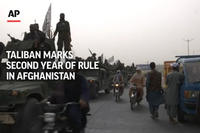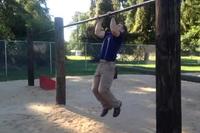The U.S. Army Special Operations Command is the largest of the service components that make up U.S. Special Operations Command and provides about 70% of the special operations personnel in Central Command's theater. On any given day, dozens of USASOC elements are deployed around the world.
Comprised of 26,000 personnel, USASOC combines a vast range of warfighting skills, from raiding and airfield seizures, to human-terrain mapping and cultural analysts.
Mission
The mission of the U.S. Army Special Operations Command is to organize, train, educate, man, equip, fund, administer, mobilize, deploy and sustain Army special operations forces to conduct successful worldwide special operations, across the range of military operations, in support of regional combatant commanders, American ambassadors and other agencies as directed.
About U.S. Army Special Operations Command
Since Sept. 11, 2001, few elements of the U.S. military have been more involved in the Global War on Terrorism than the soldiers of the U.S. Army Special Operations Command, or USASOC.
In Operation Enduring Freedom, Operation Iraqi Freedom and numerous other hotspots around the world, USASOC soldiers have been amongst the first forces to deploy in support of U.S. and coalition force objectives.
Many of these soldiers, most of them having served in numerous combat rotations, remain deployed to those locations, along with conventional forces and multinational partners, to help ensure the success of all GWOT operations, whether in a frontline combat role or a humanitarian assistance function.
USASOC Subcommands
With an allocated strength of approximately 22,000 soldiers, USASOC commands active-duty and Army Reserve special operations forces. The command also provides oversight of Army National Guard special operations forces' readiness, organization, training and employment in coordination with the National Guard Bureau and state adjutants general.
USASOC controls seven major subordinate elements, which in turn train and maintain forces for deployment by USSOCOM to combatant command theaters worldwide.
USASOC's major subordinate commands include the U.S. Army Special Forces Command (Airborne) and the U.S. Army John F. Kennedy Special Warfare Center and School, both located at Fort Liberty, N.C. Its major subordinate units include the 75th Ranger Regiment at Fort Moore, Georgia; the 160th Special Operations Aviation Regiment (Airborne) at Fort Campbell, Kentucky; and the 4th Psychological Operations Group (Airborne), the 95th Civil Affairs Brigade (Airborne) and the Sustainment Brigade (Special Operations) (Airborne), all at Fort Bragg.
The U.S. Army Special Forces Command (Airborne), Fort Bragg, controls five active Special Forces groups and has training oversight for two groups in the Army National Guard. The Green Berets are uniquely selected, trained and equipped for deployment around the world during peacetime, conflict and war. Regionally and culturally oriented, Special Forces soldiers are experts in unconventional warfare, direct action, special reconnaissance, foreign internal defense and combating terrorism.
The U.S. Army John F. Kennedy Special Warfare Center and School (SWCS) at Fort Bragg is one of the Army's premier education institutions, managing and resourcing professional growth for soldiers in the Army's three distinct special-operations branches: special forces, civil affairs and military information support.
The 75th Ranger Regiment at Fort Benning is the Army's premier light infantry force. The Rangers are flexible, highly trained and rapidly deployable soldiers with specialized skills who can be employed against a variety of targets. The regiment's three battalions plan and conduct direct-action missions in support of U.S. policy objectives.
The U.S. Army Special Operations Aviation Command organizes, mans, trains, resources and equips ARSOAC units to provide responsive, special operations aviation support to Special Operations forces and is the USASOC aviation staff proponent.
The 95th Civil Affairs Brigade (Airborne), Fort Bragg, is the only active component civil affairs brigade within the Defense Department. Its primary mission is to provide operational and tactical civil affairs support to special operations forces and rapidly deploying contingency forces. It also must maintain the ability to provide operational and tactical civil affairs support to conventional forces in collaboration with Army Reserve civil affairs forces.
The 528th Sustainment Brigade (Airborne), Fort Bragg, supports all elements of the special operations community in the Global War on Terrorism. The unit is composed of the 112th Special Operations Signal Battalion, which provides cutting-edge telecommunications; ARSOF Liaison Elements (ALE), which are oriented regionally on Army special operation forces logistics; and the Special Troops Battalion. The 528th Sustainment Bde. (A) also provides ARSOF with two unique capabilities: the ARSOF Support Cell (ASC) and two Medical Level II teams.
The 4th Military Information Support Group (Airborne), Fort Bragg, is the only active-duty Army psychological operations unit, constituting 26% of all U.S. Army psychological operations units. The unit is divided into four Strategic PSYOP Battalions (or POBs), one Tactical PSYOP Battalion and one PSYOP Dissemination Battalion. The four Strategic PSYOP Battalions are oriented regionally and support the Regional Combatant Commands in the planning and production of PSYOP programs.
Ready to Join the Military?
We can put you in touch with recruiters from the different military branches. Learn about the benefits of serving your country, paying for school, military career paths, and more: sign up now and hear from a recruiter near you











